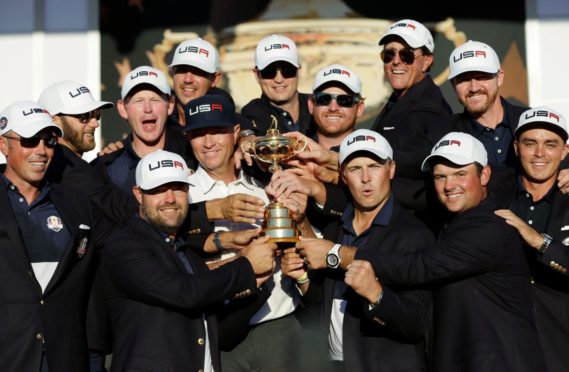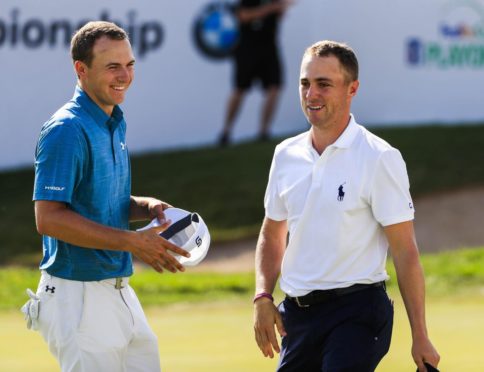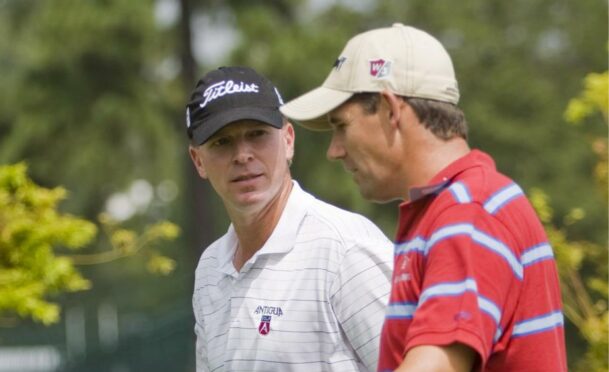If the law of averages was actionable, this would be the greatest crime in sporting history.
Is there a single contest in world sport like the Ryder Cup? The underdog wins so often that you’d assume it could simply no longer be one.
Yet here we are, at the 43rd staging of the event. And despite seven of the nine contests this century so far going the way of Europe – two of them by record margins – the United States are as usual heavily favoured to win this week at Whistling Straits.
There is surely no other contest in top-level sport where the underdog wins so regularly. The huge resources of American professional golf, handsomely replenished annually by their gargantuan college system and the legion of country clubs nationwide, getting banjoed on a biennial basis by Swedes, Germans, Danes, Spaniards and a series of uppity Irishmen.
Losing made the Americans care about the Ryder Cup
Previously, of course, the Ryder Cup was barely a contest, and always a more important thing in Great Britain and Ireland – prior to 1979 – than it was in the US. Famously, Tony Jacklin and Severiano Ballesteros turned that around, mixing quality – Seve himself, Faldo, Lyle, Langer, Woosnam – with a ragtag bag of misfits.
But the team ethic that sustains Europe until this day made the Jose Riveros and Paul Ways and Philip Waltons and Christy O’Connor Jrs play like lions in this format.
Europe’s success in the Ryder Cup not only became a totem for golf on this side of the Atlantic. Actually losing something where the odds were so much in their favour engendered a fervour and purpose in the Americans as well.
The scenes we can expect on the shores of Lake Michigan will reflect that. The US’s major sports – NFL, baseball and the NBA – are basically played within its own borders. The Ryder Cup has pretty much re-introduced America to international competition.
And despite getting tanked regularly, they love it. You fervently wish they’d find just one more chant than repeatedly shouting ‘U-S-A, U-S-A’ but it’s early days, bless.
The ‘team ethic’ explanation doesn’t work in the 2020s
The standard explanation for Europe’s recent success is that the US doesn’t get the team ethic. I’ve subscribed to this view on occasion, but it’s pretty well unsustainable in the 21st century.
There are far closer relationships between players on this week’s US team than there are in Europe’s. Childhood friends Jordan Spieth and Justin Thomas, for example.
Brooks Koepka’s ongoing feud with Bryson DeChambeau and his recent comments to Golf Digest of how awkward the whole process is for him shouldn’t really mean too much.
I recall Koepka looking perfectly comfortable when the US were winning at Hazeltine four years ago. DeChambeau may be hidden in foursomes – probably should be – but he should be fine on his own ball in fourballs and singles.
And anyway, there’s been some proper enmity among some Europeans even during their winning run, and it wasn’t terminal.
The US has caught up on strategy and stats
In recent Ryder Cups, Europe have augmented their perceived advantage in attitude by working the laptops. Paul McGinley and Thomas Bjorn deluged their captaincies with stats, seeking marginal gains with the figures, and it largely worked.
McGinley’s super-meticulous approach contrasted starkly with Tom Watson – literally – jotting pairings on the back of a napkin and going with his hunches at Gleneagles in 2014. But he was the last of the US old guard.
This year’s captains Steve Stricker and Padraig Harrington have both wholeheartedly embraced the figures. There’s not a number that’s been left unstudied. I doubt there’s any real advantage now to be had by looking going through strokes-gained with a nit comb.
Stricker is also a safe pair of hands, unlikely to make the heinous mistakes of previous US captains. There’ll be no Watson at Gleneagles. No hapless Hal Sutton at Oakland Hills in 2004. No Corey Pavin and the leaky waterproofs at Celtic Manor, or Jim Furyk’s wildcards and pairing of DeChambeau and Phil Mickelson in foursomes (really?) in Paris,
‘Experience’ works both ways
TEAM EUROPE 🇪🇺👊 pic.twitter.com/QVSBYz7R7x
— Ryder Cup Europe (@RyderCupEurope) September 12, 2021
The US has an inexperienced team – certainly compared to Europe. While the first tee at the Ryder Cup is a different experience to anything else in golf, it’s a fleeting one.
I can’t believe for a minute that someone with the resolve of Collin Morikawa on the back nine at Sandwich in July is going to be waylayed for long, if it all.
And “experience” actually works both ways. Eventually, surely, Europe going repeatedly back to the old stagers like Poulter, Westwood, Casey and Garcia is going to exceed their considerable shelf-life.
I thought Paris was the last, triumphant go-round for most them. Europe could have done with more new blood than just Viktor Hovland and 35-year-old Bernd Wiesberger this time.
But for me the biggest advantage is home. Since Sutton’s disaster at Oakland Hills in 2004, with the special exception of Medinah in 2012, every Ryder Cup has gone to the home team.
Whistling Straits is not your typical-looking US layout, but it is one in disguise. Despite looking like an Irish links, it plays through the air like a Hazeltine or a Valhalla. It’s massively long, and Stricker will have tailored it to his team’s advantage, as he should.
It’s all in the US team’s favour this time
Welcome to the @RyderCupUSA team room, where 32 is considered old and multiple players were barely out of diapers when the U.S. stormed back to win at Brookline.
How the Americans plan to rely on a youth movement this week to win back the Ryder Cup: https://t.co/4K0QMUCJHK pic.twitter.com/YDbHmYAERC
— Will Gray (@WillGrayGC) September 20, 2021
So although Europe’s recent record shouldn’t mean they are underdogs, they pretty much are. This team thing is not so much of a super-science that the Americans can’t get around it. They did in 2008 and 2016.
We shouldn’t underplay the achievement of Catriona Matthew and the European women in Ohio three weeks ago. Winning in America is tough – winning in the current circumstances is exceptional.
If Harrington and this veteran European team can win, it’ll be one of the greatest of even this run. But you feel that it’s all in the US team’s favour, this time at least.


